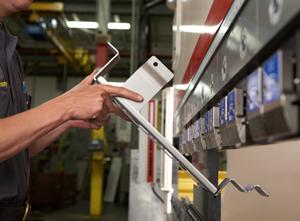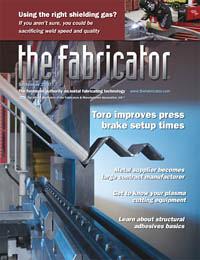- FMA
- The Fabricator
- FABTECH
- Canadian Metalworking
Categories
- Additive Manufacturing
- Aluminum Welding
- Arc Welding
- Assembly and Joining
- Automation and Robotics
- Bending and Forming
- Consumables
- Cutting and Weld Prep
- Electric Vehicles
- En Español
- Finishing
- Hydroforming
- Laser Cutting
- Laser Welding
- Machining
- Manufacturing Software
- Materials Handling
- Metals/Materials
- Oxyfuel Cutting
- Plasma Cutting
- Power Tools
- Punching and Other Holemaking
- Roll Forming
- Safety
- Sawing
- Shearing
- Shop Management
- Testing and Measuring
- Tube and Pipe Fabrication
- Tube and Pipe Production
- Waterjet Cutting
Industry Directory
Webcasts
Podcasts
FAB 40
Advertise
Subscribe
Account Login
Search
Toro trims waste with press brake tooling upgrade
Turf maintenance equipment manufacturer reduces setup times 40 percent
- September 11, 2007
- Article
- Bending and Forming
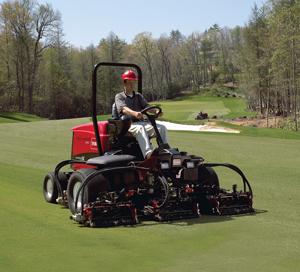
Toro Co. has found that in its high-end commercial mowers, sheet metal is the second most costly item. Toro's own manufacturing plants compete with outside vendors, which fosters competition, innovation, and cost-cutting measures.
Toro, which has been manufacturing outdoor products since 1914, has more than 50 percent of the commercial and institutional lawn mower market. But before these advanced machines ever roar down a golf course fairway or navigate a city park, Toro depends on its Shakopee facility to provide the sheet metal—faster, better, and at lower cost than outside vendors can. In fact, the Shakopee facility vies for jobs against outside vendors to ensure it provides Toro with the best value.
To remain competitive in this environment, Rob McArdell, principal manufacturing engineer for Toro, realized he needed new, more flexible fabricating equipment. What he didn't realize at the time was just how versatile press brake tooling could be.
2,000 Reasons to Make a Change
With many of its commercial and institutional products custom-built, Toro counts on innovation to grow its market position. But custom products require more custom-engineered sheet metal parts. More than 2,000 part numbers run through Toro's press brakes.
Before Toro upgraded its press brake tooling, a majority of these parts required specialized tooling rather than off-the-shelf tooling. This meant the company faced longer lead-times, more tooling setups and teardowns, and higher tooling costs. Eventually Toro's sheet metal shop reached a tipping point in tooling inventory. The sheer number of specially made press brake tools limited its ability to keep up with demand.
"We had a situation where most of our parts had a special tool associated with them," McArdell said. "Between having special tools built and constantly changing them out, we faced significant cost and time issues."
Furthermore, they were working with traditional press brake tooling. It was not precision-ground, did not offer quick-change capabilities, and often required shimming.
The tooling, along with outdated press brakes, hampered the Shakopee facility's productivity. At one point Toro used Shakopee for just 5 to 10 percent of its sheet metal work, despite being Toro's only internal sheet metal provider. Many of the sheet metal parts were produced more efficiently by outside vendors.
Pressing Forward With New Brakes and Tools
In 1999 McArdell decided it was time to invest in some productivity-enhancing technologies and purchased new Cincinnati CNC press brakes. These brakes could help Toro achieve greater accuracy and more versatility than the previous machines.
The next step was to find the right tooling to outfit the new press brakes. McArdell used a comprehensive approach in the selection process.
"We looked at everything on the market in terms of cost, quality, precision, service, delivery, and quick-change ability," recalled McArdell.
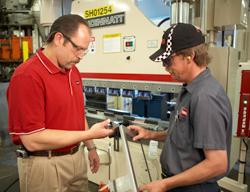
Principal Manufacturing Engineer Rob McArdell, left, inspects a part. McArdell spearheaded an effort to modernize Toro's forming processes, which included upgrading to CNC press brakes and hardened, precision-ground, quick-change press brake tooling.
McArdell chose Wilson Tool's European-style tooling with sectionalized punches precision-ground to ±0.0008 inch (0.02 mm). He recently added Wilson Express Clamps™ for faster punch loading.
Knocking Down Setup Times
Toro's sheet metal fabricators were accustomed to traditional press brake tooling setups. This was often a long process that included locating the tooling from a vast inventory, side-loading the punch, shimming the die, running tests, and making adjustments as needed. This method could take several hours, wasting valuable production time.
With the new tooling the entire process is leaner. The tooling is sectionalized so it is easily installed by one press brake operator. The clamping system allows for fast, vertical punch installation. And the new tooling is precision-ground, nearly eliminating the need for shimming and testing.
"We complete 50 to 60 individual components a day with lot sizes of about 100, so it's important that our tooling setups and teardowns be as efficient as possible," McArdell said. "With our old tooling, we couldn't transition this fast, or achieve the precision and repeatability that we have now."
McArdell said that setup times have been reduced by about 40 percent with the new tooling.
Flexibility Reduces Tooling Inventory
The benefits of more flexible tooling also are evident at Toro's Shakopee facility. Because the new tooling is sectionalized, Toro's press brake operators can mix and match the tooling to virtually any desired length. Sectionalized tooling has another advantage: If a piece of tooling requires replacement, it is much less expensive to replace one piece than an entire punch.
In conjunction with new press brakes, the tooling allows Toro fabricators to achieve the accuracy required for air bending. Using 75-degree and gooseneck-style punches, they can use one set of tooling and vary the bend angle to produce many different parts.
According to McArdell, this flexibility translates to a significant reduction in tooling inventory for Toro. "Eighty percent of our tooling used to be part-specific. Now we can run 2,000 part numbers through our press brakes with just six cabinets of tools."
Toro is also seeing major tooling cost savings because of the reduced inventory. "We probably have $150,000 worth of Wilson tools in the shop. Compared to spending $1,000 per part number on a specialized tool, we're coming out well ahead," McArdell said.
Three D's: Durability, Delivery, and Dependability
The change meant a tooling upgrade to high-alloy, wear-resistant tool steel. This material is more effective than lower-grade materials on sheet metal with various thicknesses, which translates to less tool maintenance.
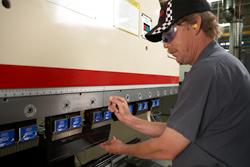
Wilson's Express manual clamping system for press brake tooling eliminates the need to slide punches in from the end of the machine. After the operator loads the tooling into the clamp, spring-loaded clamps capture the punch and hold it in place. The operator locks the tooling in place by pushing the removable lever upward. The system accepts punches up to 16.34 in. (415 mm) long or individual pieces of sectionalized punches.
Toro also applies Wilson's Nitrex™ surface enhancement to 40 percent of its tooling. Nitrex achieves a surface hardness of 70 Rockwell hardness C, increasing durability by several times that of untreated tooling. It also reduces galling and eliminates surface rust.
According to McArdell, the tools have been essentially maintenance-free since their purchase in 1999. "Many of these tools have been giving us precision bends out of the box for the last seven years without regrinds, which is phenomenal," McArdell said. "Life expectancy is usually a couple of years if you're lucky."
Tool performance is important, but McArdell has found that getting tools on time is equally vital. His facility ships parts to two assembly plants, each of which depends on timely turnaround.
The fabricating floor plan in Shakopee is configured for lean manufacturing, with six laser cutters paired with six press brakes. As long as the tooling arrives on time, the company meets the deadlines. McArdell is pleased with Wilson Tool's same-day delivery on many standard tools.
"We run our sheet metal in lean cells to efficiently move parts from laser cutting, to press brake, then shipped out the door," McArdell noted. "The faster we can get tooling orders in and up and running, the better our throughput."
The Results Are In
Since choosing Wilson Tool as its primary tooling partner, Toro's Shakopee facility has noticed significant changes in its press brake productivity. In addition to the 40 percent decrease in tooling changeover, McArdell has seen his plant's share of the work load greatly increase. While it used to handle just 5 to 10 percent of Toro's sheet metal needs for commercial mowing equipment, today it fills 60 percent. This is a result of the Shakopee plant's cost effectiveness. When Toro gets sample bids from outside vendors, Shakopee now comes in consistently lower.
McArdell is in the process of further expanding the facility's bending capabilities. They recently purchased two more Cincinnati press brakes and $45,000 worth of Wilson tools.
Related Companies
subscribe now

The Fabricator is North America's leading magazine for the metal forming and fabricating industry. The magazine delivers the news, technical articles, and case histories that enable fabricators to do their jobs more efficiently. The Fabricator has served the industry since 1970.
start your free subscription- Stay connected from anywhere

Easily access valuable industry resources now with full access to the digital edition of The Fabricator.

Easily access valuable industry resources now with full access to the digital edition of The Welder.

Easily access valuable industry resources now with full access to the digital edition of The Tube and Pipe Journal.
- Podcasting
- Podcast:
- The Fabricator Podcast
- Published:
- 04/16/2024
- Running Time:
- 63:29
In this episode of The Fabricator Podcast, Caleb Chamberlain, co-founder and CEO of OSH Cut, discusses his company’s...
- Trending Articles
AI, machine learning, and the future of metal fabrication

Employee ownership: The best way to ensure engagement

Dynamic Metal blossoms with each passing year

Steel industry reacts to Nucor’s new weekly published HRC price

Metal fabrication management: A guide for new supervisors

- Industry Events
16th Annual Safety Conference
- April 30 - May 1, 2024
- Elgin,
Pipe and Tube Conference
- May 21 - 22, 2024
- Omaha, NE
World-Class Roll Forming Workshop
- June 5 - 6, 2024
- Louisville, KY
Advanced Laser Application Workshop
- June 25 - 27, 2024
- Novi, MI
























